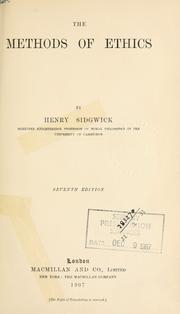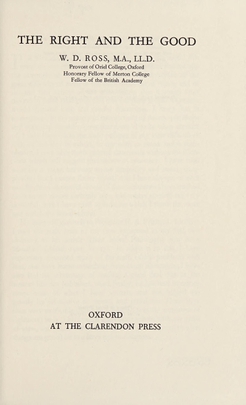
In moral philosophy, consequentialism is a class of normative, teleological ethical theories that holds that the consequences of one's conduct are the ultimate basis for judgement about the rightness or wrongness of that conduct. Thus, from a consequentialist standpoint, a morally right act is one that will produce a good outcome. Consequentialism, along with eudaimonism, falls under the broader category of teleological ethics, a group of views which claim that the moral value of any act consists in its tendency to produce things of intrinsic value. Consequentialists hold in general that an act is right if and only if the act will produce, will probably produce, or is intended to produce, a greater balance of good over evil than any available alternative. Different consequentialist theories differ in how they define moral goods, with chief candidates including pleasure, the absence of pain, the satisfaction of one's preferences, and broader notions of the "general good".
In ethical philosophy, ethical egoism is the normative position that moral agents ought to act in their own self-interest. It differs from psychological egoism, which claims that people can only act in their self-interest. Ethical egoism also differs from rational egoism, which holds that it is rational to act in one's self-interest. Ethical egoism holds, therefore, that actions whose consequences will benefit the doer are ethical.
Ethics is the philosophical study of moral phenomena. Also called moral philosophy, it investigates normative questions about what people ought to do or which behavior is morally right. The main branches of ethics include normative ethics, applied ethics, and metaethics.
Hedonism refers to the prioritization of pleasure in one's lifestyle, actions, or thoughts. The term can include a number of theories or practices across philosophy, art, and psychology, encompassing both sensory pleasure and more intellectual or personal pursuits, but can also be used in everyday parlance as a pejorative for the egoistic pursuit of short-term gratification at the expense of others.
Normative ethics is the study of ethical behaviour and is the branch of philosophical ethics that investigates questions regarding how one ought to act, in a moral sense.
In ethical philosophy, utilitarianism is a family of normative ethical theories that prescribe actions that maximize happiness and well-being for the affected individuals. In other words, utilitarian ideas encourage actions that ensure the greatest good for the greatest number. Although different varieties of utilitarianism admit different characterizations, the basic idea behind all of them is, in some sense, to maximize utility, which is often defined in terms of well-being or related concepts. For instance, Jeremy Bentham, the founder of utilitarianism, described utility as the capacity of actions or objects to produce benefits, such as pleasure, happiness, and good, or to prevent harm, such as pain and unhappiness, to those affected.
Moral relativism or ethical relativism is used to describe several philosophical positions concerned with the differences in moral judgments across different peoples and cultures. An advocate of such ideas is often referred to as a relativist.
Moral realism is the position that ethical sentences express propositions that refer to objective features of the world, some of which may be true to the extent that they report those features accurately. This makes moral realism a non-nihilist form of ethical cognitivism with an ontological orientation, standing in opposition to all forms of moral anti-realism and moral skepticism, including ethical subjectivism, error theory, and non-cognitivism. Moral realism's two main subdivisions are ethical naturalism and ethical non-naturalism.
In environmental philosophy, environmental ethics is an established field of practical philosophy "which reconstructs the essential types of argumentation that can be made for protecting natural entities and the sustainable use of natural resources." The main competing paradigms are anthropocentrism, physiocentrism, and theocentrism. Environmental ethics exerts influence on a large range of disciplines including environmental law, environmental sociology, ecotheology, ecological economics, ecology and environmental geography.
A land ethic is a philosophy or theoretical framework about how, ethically, humans should regard the land. The term was coined by Aldo Leopold (1887–1948) in his A Sand County Almanac (1949), a classic text of the environmental movement. There he argues that there is a critical need for a "new ethic", an "ethic dealing with human's relation to land and to the animals and plants which grow upon it".
In moral philosophy, deontological ethics or deontology is the normative ethical theory that the morality of an action should be based on whether that action itself is right or wrong under a series of rules and principles, rather than based on the consequences of the action. It is sometimes described as duty-, obligation-, or rule-based ethics. Deontological ethics is commonly contrasted to consequentialism, utilitarianism, virtue ethics, and pragmatic ethics. In this terminology, action is more important than the consequences.
In ethics, welfarism is a theory that well-being, what is good for someone or what makes a life worth living, is the only thing that has intrinsic value. In its most general sense, it can be defined as descriptive theory about what has value but some philosophers also understand welfarism as a moral theory, that what one should do is ultimately determined by considerations of well-being. The right action, policy or rule is the one leading to the maximal amount of well-being. In this sense, it is often seen as a type of consequentialism, and can take the form of utilitarianism.
Moral nihilism is the meta-ethical view that nothing is morally right or morally wrong and that morality does not exist.

Utilitarianism is an 1861 essay written by English philosopher and economist John Stuart Mill, considered to be a classic exposition and defence of utilitarianism in ethics. It was originally published as a series of three separate articles in Fraser's Magazine in 1861 before it was collected and reprinted as a single work in 1863. The essay explains utilitarianism to its readers and addresses the numerous criticism against the theory during Mill's lifetime. It was heavily criticized upon publication; however, since then, Utilitarianism gained significant popularity and has been considered "the most influential philosophical articulation of a liberal humanistic morality that was produced in the nineteenth century."
Quasi-realism is the meta-ethical view which claims that:
- Ethical sentences do not express propositions.
- Instead, ethical sentences project emotional attitudes as though they were real properties.
Secular ethics is a branch of moral philosophy in which ethics is based solely on human faculties such as logic, empathy, reason or moral intuition, and not derived from belief in supernatural revelation or guidance—a source of ethics in many religions. Secular ethics refers to any ethical system that does not draw on the supernatural, and includes humanism, secularism and freethinking. A classical example of literature on secular ethics is the Kural text, authored by the ancient Indian philosopher Valluvar.
Two-level utilitarianism is a utilitarian theory of ethics developed by R. M. Hare. According to the theory, a person's moral decisions should be based on a set of moral rules, except in certain rare situations where it is more appropriate to engage in a 'critical' level of moral reasoning.
Animal ethics is a branch of ethics which examines human-animal relationships, the moral consideration of animals and how nonhuman animals ought to be treated. The subject matter includes animal rights, animal welfare, animal law, speciesism, animal cognition, wildlife conservation, wild animal suffering, the moral status of nonhuman animals, the concept of nonhuman personhood, human exceptionalism, the history of animal use, and theories of justice. Several different theoretical approaches have been proposed to examine this field, in accordance with the different theories currently defended in moral and political philosophy. There is no theory which is completely accepted due to the differing understandings of what is meant by the term ethics; however, there are theories that are more widely accepted by society such as animal rights and utilitarianism.

The Methods of Ethics is a book on ethics first published in 1874 by the English philosopher Henry Sidgwick. The Stanford Encyclopedia of Philosophy indicates that The Methods of Ethics "in many ways marked the culmination of the classical utilitarian tradition." Noted moral and political philosopher John Rawls, writing in the Forward to the Hackett reprint of the 7th edition, says Methods of Ethics "is the clearest and most accessible formulation of ... 'the classical utilitarian doctrine'". Contemporary utilitarian philosopher Peter Singer has said that the Methods "is simply the best book on ethics ever written."

The Right and the Good is a 1930 book by the Scottish philosopher David Ross. In it, Ross develops a deontological pluralism based on prima facie duties. Ross defends a realist position about morality and an intuitionist position about moral knowledge. The Right and the Good has been praised as one of the most important works of ethical theory in the twentieth century.




